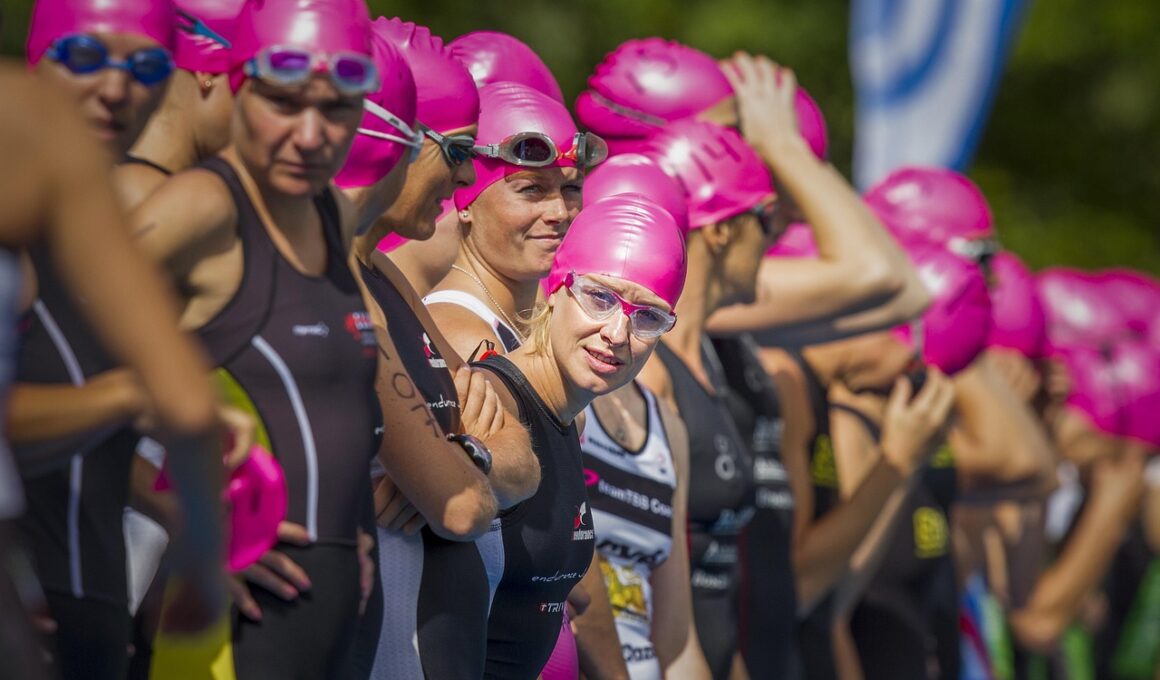Nutrition and Support Networks in Triathlon Training
Nourishing your body is essential for success in triathlon training. Nutrition plays a crucial role in enhancing performance, recovery, and overall health. Triathletes require a balanced diet rich in carbohydrates, proteins, and healthy fats to fuel their rigorous training sessions. It is important to consume nutrient-dense foods such as whole grains, lean meats, fruits, and vegetables. Paying attention to hydration is equally vital. Maintaining fluid intake will help prevent dehydration, a common issue faced by athletes. Establishing a meal plan that includes eating targeted nutrients before, during, and after workouts can significantly improve performance. Many athletes find that meal prepping allows them to stick to their nutritional needs without sacrificing time covered by their busy schedules. Additionally, triathletes can benefit from consulting with nutritionists specializing in sports performance to create personalized meal plans. Also, utilizing mobile apps can help track dietary intake and ensure that caloric needs are met effectively. Exploration of nutritional supplements should be done cautiously and ideally under professional guidance. By developing the right nutritional strategies and support, triathletes can optimize their training outcomes and well-being.
As you delve deeper into the world of triathlon training, the importance of social support networks becomes apparent. These networks serve a vital role in providing emotional and motivational support, which is crucial for athletes. Many triathletes join local clubs, training groups, or communities that inspire camaraderie. Socializing with fellow athletes fosters a sense of belonging and helps mitigate feelings of isolation that can occur during intense training. Engaging with others allows triathletes to share their experiences, challenges, and successes. Participating in regular group workouts can enhance one’s training regime while simultaneously building important relationships. These support systems can also help with accountability, making it less likely for athletes to skip workouts. Support networks may include friends and family who understand the dedication required for triathlons. Further, sharing victory celebrations and overcoming personal hurdles can deepen these connections. Online forums and platforms can also supplement social interactions, especially among those who travel or live in remote areas. Finding a support network is key, transforming not just the journey of training but also enriching the triathlon experience itself.
Setting clear goals is another significant aspect of triathlon training, and the role of nutritional habits ties closely into this. Triathletes often create performance objectives that correspond with their dietary plans. When setting these goals, focusing on both short-term and long-term outcomes ensures balanced approaches. For instance, while it may be appealing to drastically change one’s diet to drop weight quickly, sustainable and gradual changes in nutrition often yield better results. Observing how certain foods or timings impact energy levels can lead to more mindful eating patterns. In addition, participants can set nutritional goals in conjunction with other performance milestones, such as distance or speed increases. Keeping a food diary can support this process by identifying effective meals and snacks. Engaging in discussions with peers about their goals and how they manage nutrition can be eye-opening and provide new insights. The synergy between structured training plans and dietary discipline helps athletes achieve personal bests while improving their overall health. By fostering these goal-oriented habits, triathletes can propel themselves further along their fitness journeys.
Incorporating science into triathlon nutrition makes for tried and tested approaches. Awareness of macronutrients is essential for triathletes looking to enhance their performance. Understanding the role of carbohydrates, proteins, and fats helps athletes decide what to eat before and after training sessions. For example, consuming carbohydrates before events ensures readily available energy. On the other hand, protein is important post-exercise for muscle recovery and growth. Many athletes now utilize sports nutrition literature to guide their dietary choices. Additionally, numerous scientific studies provide insights regarding optimal fueling strategies during races, including carbohydrate gels and electrolyte drinks. Adapting these suggestions to individual preferences has become commonplace among serious competitors. Furthermore, research into the timing of meals and snacks can impact endurance levels; ingesting glucose before races can offer an energy boost. Triathletes are encouraged to experiment with different nutrition strategies during training to determine what works best for their unique bodies. Implementing scientific principles aids in developing a comprehensive plan that optimally supports not just their training but also enhances their performance outcomes.
Community impact also plays a crucial role in supporting triathletes in their nutrition and training journeys. Local events, mentoring programs, and workshops enhance the overall culture around triathlon training. Many race organizers partner with nutrition experts, offering post-race meals that promote recovery among competitors. Local athletes can create synergy through shared activities, such as potlucks where healthy meal options are encouraged. Support from coaches and mentors often extends beyond the training sessions, fostering ongoing discussions around nutrition and lifestyle choices. Participating in webinars or group discussions hosted by local organizations can expose athletes to innovative nutritional tactics. Being part of a warm and engaged community creates an environment where sharing knowledge is promoted. Many seasoned athletes are happy to share their personal experiences with nutrition strategies that have worked for them. These interactions help inspire newcomers to develop their plans successfully. Furthermore, social media platforms are increasingly becoming hubs for information exchange, uniting athletes globally. Combining local and online community support elevates athletes’ chances for success through nurturing a culture of knowledge sharing and encouragement.
The Benefits of Team-Based Nutrition Planning
Collaborating with teammates on nutrition planning offers unique advantages for triathletes striving for excellence. Team-based approaches foster accountability, letting individual athletes set and share specific nutrition goals with one another. When individuals form small groups focusing on distinct dietary practices, they can collectively motivate and support each other. Sharing information about meal options and dietary challenges reinforces a healthy, competitive spirit, encouraging group members to rise above hurdles together. Additionally, group discussions can aid in identifying food preferences that contribute to healthier choices during training and competitions. Variability in nutritional problems can often spark problem-solving strategies, creating new understandings amongst teammates. Furthermore, developing shared cooking sessions or meal handouts enhances social bonding while contributing practical benefits. Member expertise around nutrition, such as calorie-counting or balanced meals, can support everyone’s journey, as each teammate’s background may provide unique insights. Overall, these collaborative approaches not only enhance performance but also reinforce bonds among teammates, evolving a shared mission through successful nutrition practices. In conclusion, forming a nutrition-centric community improves training outcomes significantly, making the journey toward the finish line more enjoyable and rewarding.
Ultimately, the integration of nutrition and community support creates a holistic framework for success in triathlon training. Athletes who understand the impact of their dietary choices on performance experience tangible benefits during their training rides and runs. Equally important is the recognition of having people around who motivate, uplift, and share knowledge. They complement the solitary aspects of training, bringing together diverse backgrounds and experiences. With a focus on both nutrition and community, triathletes can explore new horizons in reaching their racing potential and achieving personal milestones. Each triathlete’s story is further enriched by the collective efforts of support systems and nutritional planning. As athletes celebrate victories—whether big or small—recognizing the communal aspects reinforces the idea that no one achieves success alone. The road to improvement may be tough, yet the wings of community and good nutrition can ease the burden. To excel in such a demanding sport, it is paramount to embrace both the science of nutrition and the power of networks to turn challenges into achievements. Therefore, triathlon training grows into not just a journey of physical performance but an enduring testament to teamwork.
A vital aspect of any training experience is understanding the connection between nutrition and recovery. Triathletes put their bodies under significant stress, and therefore, fueling recovery becomes just as crucial as the workouts themselves. After intensive sessions, muscle recovery aids in repairing tissues, replenishing glycogen stores, and restoring overall balance in the body. Emphasizing post-workout nutrition is key; consuming the right combination of proteins and carbs in a timely manner can expedite the recovery process. Many athletes rely on smoothies, protein shakes, or balanced meals containing essential nutrients. Monitoring recovery allows athletes to assess their bodies more effectively, aiding in avoiding the risk of injuries or burnout. Sharing recovery strategies within training groups can facilitate a broader understanding of effective techniques and approaches while encouraging everyone to adopt best practices. Optimizing recovery through nutrition marks a turning point in athletes’ progression. Communities focusing on recovery reinforce positive habits around nutrition and engage athletes in meaningful dialogues. Learning from each other ultimately highlights that recovery is not just an individual endeavor but a shared experience among friends committed to supporting one another’s journeys.


